发布时间:2013-04-07
After one highly effective semester experience in Finland, I feel there is too much to show and too much to say that I couldn’t find where should I start. To be simple, I just want to pick up the most impressive part of my exchange experience in Aalto University, which is the education system in Finland and my real study life in Helsinki.
Like every foreigner going to Finland, I was quite impressed by great language skills of local people. For example, in Helsinki, from 9 years old young pupil to 90 years old granny, most of people can speak English to foreigners fluently. In Finland, it’s not unusual that most young people are able to speak 3 to 5 languages. If you ask why and how, they would tell you, apart from official languages, Finnish and Swedish, they start their first foreign language, normally English, at 9 years old, then after every 2 years, they are encouraged to select another foreign language. By the time when they are 15 years old, most of them have studied 5 languages already.
With further study, I get to know that Finland is quite famous of its education system, especially in elementary education. According to OECD (Organization for Economic Co-operation and Development), Finnish Education System has been ranked the top in every 3 years PISA (Program FOR International Student Assessment) since it started from 2000. Finnish teenagers performed exceptionally in reading, mathematics and science among contemporaries worldwide, reform and restructure of Finnish secondary, higher and adult education are steadily in progress as well.
To explore reasons behind the laurel of honor, I paid special attention to information, discussion and occasions related to education in Finland. Needless to say, one of the greatest contributors of Finnish education is its egalitarian education system, with no tuition fees and free or discount meals served for students. I met a lady, who is about 40 years old from Vietnam. She told me that she has been studying Finnish language in a school for two years since she married her Finnish husband and moved to Helsinki. She could continue with her study because she doesn’t need to pay any tuition fee, but the government pays her allowance because of her study. In Aalto University, the meals for students in dining hall cost 2-5 Euros roughly with more than half discount offer.
Apart from general state subsidies in Education, I was told that the success of Finnish education also lies in its initiative ideas of education and teaching methodologies which Finnish teachers offer for students, especially for early and basic education.
Basically, Fins believe in the importance of quality early childhood is through play. The formal learning in Finland starts at seven. The idea is that before seven kids learn best through play, so by the time they go to school they are keen to start learning. Through early education stage, Children’s individuality is highly respected. In Children’s park, at the “please do play” corner in museums, in the Lego cable factory, I encountered evidences everywhere of encouraging kids to be creative, to be independent, to be unique. Another interesting thing I found is about “maternity package” -- newborn babies’ parents are given three books, one for each parent, and a baby book for the newborn angel, to foster a reading culture at the very beginning of a new life.
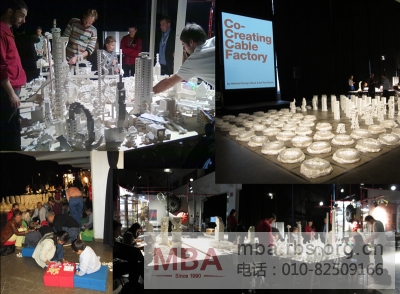
Design Week in Helsinki --- Lego designing by kids and adults in Cable Factory

“Please Do Play” Corner in Museums of Helsinki and Turku
A nine years compulsory basic education in a comprehensive school is the start point of formal education in Finland. No key schools, no gifted programs in elementary education. Teachers in Finland have a lot of autonomy in teaching, including choosing text books. Classes are relatively small, hardly more than 20 pupils. Atmosphere in classrooms is informal and relaxed. Buildings are quite clean that students often wear socks without shoes. Homework is limited to allow students have enough time to participate extra-curricular activities. But outdoor activities can be quite stressed even in the coldest winter. Reading with pleasure is encouraged, children’s’ books are quite popular in book stores and I was told by the Finnish culture teacher that Finland published more books for children than other countries in the world. The local TV channels have subtitles to promote reading for kids while watching TV. As for kids who have special hobbies, for example, in music, apart from taking music class in primary school, they are also encouraged to join specialized music schools subsidized by state after class. Furthermore, they have chance to perform in the National Music Center in Helsinki during their study. I was lucky to enjoy the New Year Concert of 2013 preformed by average citizens. 3 years kids and experienced aging musicians were on the same stage.
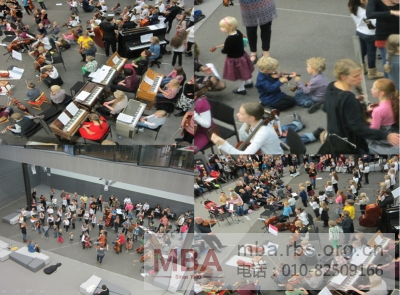
New Year Concert Stage for kids Musicians
My personal study life in Aalto University was quite impressive too. Basically, classes I took are similar to classes given in International MBA program in my home university: English-taught class, active class discussion among students and lecturers, group assignment after class. The minor differences I experienced are from diversification of courses and lecturers, hard work in group assignment, and of course, special offer of every exchange student – the interesting local culture and language class.
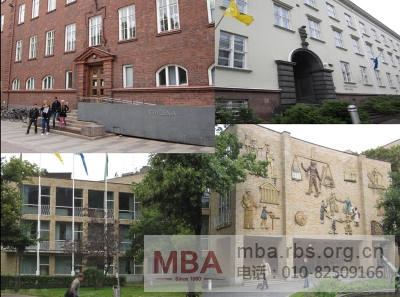
Aalto University
Exchange students in Aalto University are allowed to select any courses in the university and some are in partner universities, for example, from Helsinki University, another top university of Finland. In addition, there are normally 2 professors responsible for one course with guests in lectures. For example, in Corporate Responsibility, we had 2 professors Mina and Armi with 3 guests, one is an expert in CSR,another is a PhD. candidate who is engaged in CSR research and the third one is Mina’s co-researcher. Normally, two professors take different responsibilities in class. For instance, in Entrepreneurship and Management Innovation, we had Mr. Lahti Arto, who was nominated Finnish President and gave lectures on entrepreneurship, and another professor Mr. Majid Aramand who was in South Korean given lecture through Skype in instructing us on statistic analysis of case analysis and group assignment.
Group work and assignment is quite important in Aalto University. You might be forgiven by professors for your absence of class but may not be excused by team members in group assignment in many cases. There is absolutely no free-rider in group, everyone takes part of work to do and all members are expected to finish their own task before deadline. At the same time, a lot of discussion, investigation and team work can be involved in group assignment. For example, in Finnish culture and language class, Japanese girl Sumika and I were in a group to prepare a presentation on a famous Finnish textile brand – Marimekko.
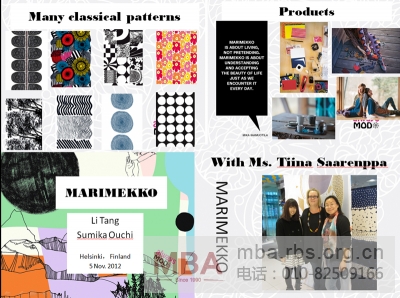
We studied history and famous designers of the company, and finally, visited its flagship store in Helsinki. With help of the store manager Ms. Tiina Saarenppa, we took photos and categorized different patterns of its productsl and tried to figure out its unique business model. We were also suggested to visit its manufacturing process for deep understanding of the company. By finishing the group assignment, we really learnt a lot out of the classroom.
Group work actually can be started at the time when the team leader building the team, team members can be quite realistic when it comes to take a new member or not in the team. They prefer selecting members who are able to get the task done rather than other reasons. It would be cool if you are experienced in any specific areas, for example, in statistical analysis, or you have special background which is match up with the group task. For example, Chinese students would be most welcome if there are any cases studying about China, which is quite a popular topic in Aalto University recently years.

Case analysis on Intellectual Capital in China
In Aalto University, you may also find some interesting classes special for China, such as China Economy Transition or Doing Business in China etc. Standing on new perspectives from foreigners, we may learn more about our home country.
As mentioned previously, one of the interesting classes I took is Finnish culture and Finnish Language. Like other class, two professors were responsible for the class, Merja was for Finnish language, and Christina was for Finnish culture.
A saying goes that Finnish Language makes other European languages are so similar to English. It is true that Finnish language is so different from English although for Chinese students they are all in alphabet form. Finnish words can be quite long with difficult “R” pronunciation and various transformations in grammar can be more difficulties than that in Japanese. However, the charm of Finnish language lies in its logic and its close meaning to nature. If you take the class, you would know that a lot of local Finns’ names are so close to nature, they can be name of trees in Finnish forests. This indicates one of the unique characteristics of being a Finn, which is part of nature. Finnish language says so much about Finnish culture in many aspects.
Christina is an expert in Finnish history and culture although she is a Swedish speaking Finn. Apart from in class lecture to introduce typical Finnish history and culture, the most interesting part of the class is the excursion. Christina and Merja took us walking around in Helsinki city and introduced us Suomenlinna Sea Fortress, architectures in Helsinki and typical famous local food and drinks. Excursion in Helsinki not only made us so enjoyable of the class but also so pride of knowing all of this about Finland. Whenever we took our friends wandering in Helsinki, we introduced what we learnt from Excursion and Finnish culture class. We feel so pride of us like we have been part of Finland.
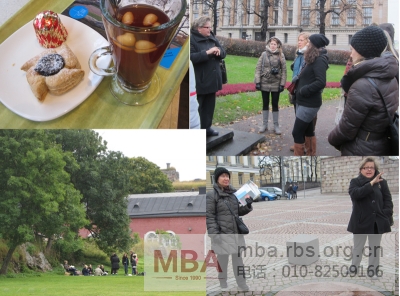
Excursion of Finnish Culture Class
Overall, I enjoyed and learnt a lot during my exchange program in Aalto University. There are quite a lot to see and to do in Helsinki in terms of Finnish history, culture, nature, innovation, and Finns themselves. I expect other peers who are going to Finland to explore more about this amazing country and achieve more from exchange semester.
